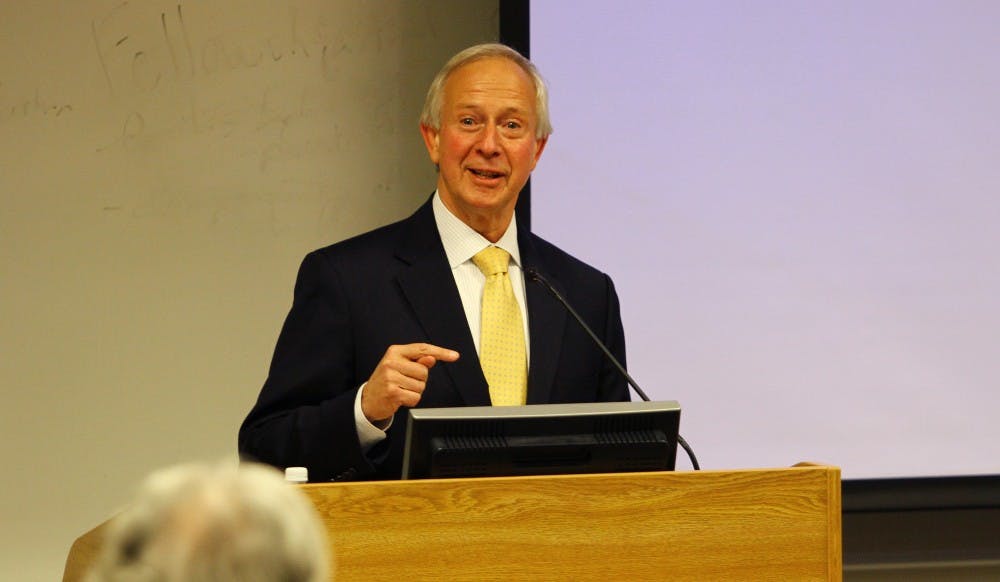Fundraising for the Duke Forward Campaign has reached the $2 billion mark, President Richard Brodhead announced in his annual address to the Academic Council Thursday.
Set to conclude in June 2017, the campaign aims to raise $3.25 billion to foster continued innovation across the University's 10 schools, health system, athletics, facilities and financial aid. During the meeting, Brodhead also addressed the many changes—both internally and externally—that Duke is undergoing.
“Our primary goal will always involve investment in people, teaching, research and clinical care, making Duke accessible to all backgrounds of students and helping students live up to their potentials,” Brodhead said.
He noted that although the total that Duke Forward has raised is impressive, it is what the University plans to do with the funding that is important—adding that "the dollars are not the goal but means to the main goal."
Since it was launched, the campaign has reached out to nine major cities across the country, organizing fundraising events where people can learn about new developments on campus, Brodhead said.
Unlike his previous annual addresses that touched upon single subjects, Brodhead articulated his vision regarding administrative leadership transition, campus construction and fundraising.
“For the last several years, there is typically some single issue that is so pressing for this community that made the sole subject of my talk,” Brodhead said. “But this year I am going to discuss three topics—people, places and funds.”
He discussed the upcoming replacement of Provost Peter Lange and Dr. Victor Dzau, CEO and president of Duke University Health System and chancellor for health affairs.
“So deep has Peter [Lange]’s impact been that we were all finding ourselves asking, how can Duke be expected to survive without him,” Brodhead said. “But the question mark has now been answered in a reassuring way.”
The choice of a new provost at the end of the search process turned out to be surprisingly easy, Brodhead said.
Incoming provost Sally Kornbluth, James B. Duke Professor of Pharmacology and Cancer Biology, is not only known for her research, people skills and creative problem solving skills, but also has an immense love for this institution and immense dedication to its values, he noted.
A search committee to fill the chancellor for health affairs will be announced within two weeks, Brodhead said. Dzau will be stepping down June 30. The search is expected to start in April and conclude in late 2014.
The chancellor for health affairs needs to be adept at understanding the business of health care and how the potentially rival commitments to business and research can be made to serve and support one another. The chancellor, like the provost, has to be deeply devoted to the existing world of teaching and research and also aware of the changing landscape, Brodhead said.
“Leadership changes are chances for institutional renewal,” he added.
In addition to these administrative changes, the University is also undergoing many physical changes, Brodhead said.
Campus renovations facilitate academic excellence and increase University connection through the shared structures of the buildings, he said.
“I remember that after Perkins reopened, the use of the library increased 40 percent in a single year,” Brodhead said. “It gave Duke information sharing and knowledge creation facility and caused a revolution in students’ intellectual life.”
Despite the perceived boom in construction this year, Brodhead highlighted that it is all part of a plan to promote greater connectedness on campus.
“Building a building can never be a goal of a university,” Brodhead said. “The real ends have to be research, teaching and the work of knowledge creation.”
The current renovation of Perkins Library—creating new study spaces and a new place for people to encounter Duke’s growing archive of primary sources—attempts to preserve the outside appearance of the building while renovating the inside, Brodhead said. It conveys the message that education has something to do with conservation, preservation and innovation, he said.
Brodhead also added that the West Union renovation project is designed to maximize students’ benefits and to create a central space for interactions.
“In the world at large, the vibrant and successful places are the ones that provide the richest chance for people to collide with one another,” Brodhead said. “But this does not happen automatically, and we have to create collision spaces that are sufficiently attractive to draw students and faculty to come in at any time for no particular reason.”
In other business:
The Academic Council Task Force for Diversity, created last month to increase faculty diversity and inclusiveness, gave the council an update on its progress.
The task force is committed to articulating a vision of a diverse and inclusive university, examining the current position and recommending actions to move the University forward, said Maurice Wallace, co-chair of the task force and professor of English and African and African American Studies.
Since the task force was created, 30 faculty volunteers have expressed strong interests in participating as members. Membership of the task force will officially be formed before the end of April, said co-chair Nan Jokerst, J.A. Jones Professor of Electrical and Computer Engineering.
Get The Chronicle straight to your inbox
Signup for our weekly newsletter. Cancel at any time.

